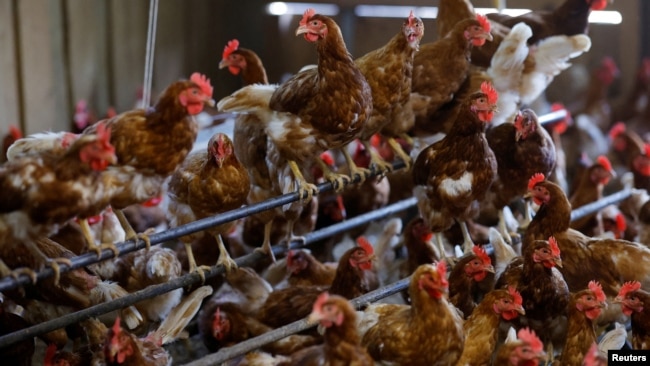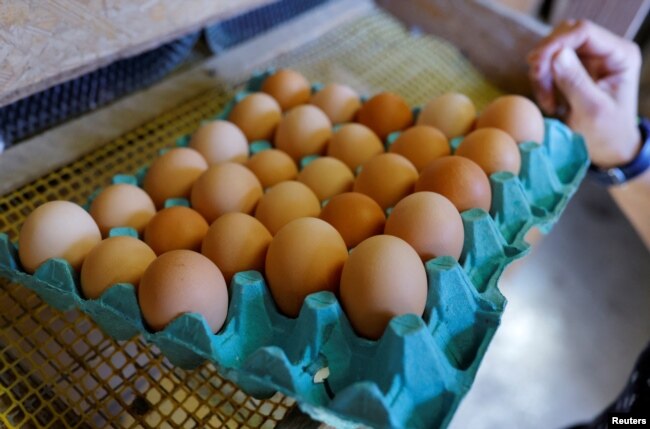鳥インフル、欧米で広く感染
飛んでくるので、屋内飼育意外防ぎようがありませんね。
”free-range”の農家さんと契約して私自身卵を購入しています。もちろん肥料も自然素材のものを与えている農家さんです。実際に見に行って契約しました。
口に入るものは、化学肥料・農薬 ”ゼロ” 自然農法の生産者を探します。
これ以上の感染拡大がないといいですね。
さぁ、今日もVOAで英語を学びましょう!!
鳥インフルエンザにより米国からフランスまでニワトリを隔離(和訳)
Bird Flu Puts Chickens into Lockdown from US to France
May 05,2022
米国では、鳥インフルエンザが蔓延する中、多くの養鶏業者が鳥を屋内で飼育しています。
一連の発生により、米国では3500万羽の農鳥が殺処分されており、米国農務省は農家に対し、感染を避けるために鳥を屋内に入れるよう勧告しています。
free-range(放し飼い)の鶏を飼育している専門養鶏家も例外ではありません。放し飼いとは、鶏が屋内外を制限なく移動することを意味します。
そのため、卵の販売業者は新しい飼育条件について購入者に知らせる必要があると、業界のオブザーバーは述べています。
このような鶏の卵は、大規模な農場で生産された卵よりも高い値段で売られています。その理由はさまざまで、有機卵の方が健康的だと考える人もいれば、味を重視する人もいます。また、有機卵の方が環境に良いとか、より人道的なプロセスで作られた卵であると言う人もいます。
アメリカの政府関係者によれば、今のところ農家の鳥を室内で飼うのが最も安全な政策だそうです。鳥インフルエンザに感染した鶏が一羽でもいれば、その鶏は殺処分されなければならないからです。
このウイルスは人間にも感染しますが、専門家はその危険性は低いと言っています。
フランスでも同じような被害が出ています。同国政府は11月から農家に鶏の屋内飼育を義務付けています。
しかし、ロイター通信によると、一部の店などでは、まだ鶏肉製品を放し飼いと表示していると言います。
「室内で飼わなければならないとは知りませんでした」とジョセフィン・バリトさんは言います。34歳の彼女は、パリの小さな店で売られている卵を見ていました。
「じゃあ、もう”放し飼い”じゃないんですね "?」と彼女。そして、"鳥インフルエンザのせいで他に選択肢がないのでしょうが、彼らはそう言うかもしれませんね 。」と付け加えます。
動物の医者によると、移動する鳥は病気を広げる可能性があるので、外に出られる鳥は鳥インフルエンザにかかるリスクがかなり高くなるそうです。
購入者の不満
米国での発生は史上2番目にひどく、今年は3500万羽以上が殺処分されました。フランスの農家は、最悪の大流行で蔓延を食い止めるために1600万羽近くを殺処分しました。また、イギリス、イタリア、スペインなどの国々でも感染が出ています。
ヨーロッパでは鶏を室内で飼うことを義務づけているため、売り手が買い手にこの変更を伝える張り紙をしても、一部の買い手には不満が残ります。
フランスの首都にある大型店で買い物をした52歳のマルク・ドセムさんは、「結局のところ、’放し飼い’の卵や有機卵の代金を支払うことになるのだが、実は鶏は空を見たことがないのだ。」と語っています。
欧州連合と英国の販売基準では、放し飼いの卵を産む鶏を16週間まで屋内で飼育した後、購入者に知らせることが義務づけられています。
米国では、鳥インフルエンザのような予期せぬ出来事で生産方法が変わった場合、オーガニック卵の生産者は食品容器でバイヤーに知らせる必要はないと農務省は述べています。
Bird Flu Puts Chickens into Lockdown from US to France
Many chicken farmers in the United States are keeping their birds inside during a spread of bird flu.
The series of outbreaks has led to the killings of 35 million farm birds in the U.S. The United States Department of Agriculture has advised farmers to keep their birds inside to avoid infection.
Specialty chicken farmers who raise free-range chickens are no exception to the policy. Free-range means the chickens move without restrictions inside and out.
So, egg sellers need to update the buying public about the new farming conditions, industry observers say.
Buyers usually pay more for eggs from these chickens than those produced on large, corporate farms. Reasons differ --- some people think organic eggs are a healthier choice while others might favor the taste. Still others might say organic eggs are a better choice for the environment or come from a more humane process.
American officials say keeping farm birds inside is the safest policy for now. They note that the entire chicken population on a single farm must be killed even if one member gets bird flu.
The virus can also infect humans, though experts say the risk is low.
In France, the flu is doing similar damage. The nation’s government has required farmers to keep chickens indoors since November.
Reuters news agency reported, however, that some stores and other businesses are still identifying the chicken products as free-range.
“I didn't know that they had to stay inside,” said Josephine Barit. The 34-year-old was looking at eggs for sale at a small store in Paris.
She said, "So it's not really 'free range' anymore?" And she added, "I suppose there is no other choice because of bird flu, but they could say so."
Animal doctors say birds that can go outside are at a much higher risk of getting bird flu because birds that travel can spread the disease.
The U.S. Department of Agriculture suggests farmers keep birds produced for food indoors as long as the bird flu outbreak is ongoing, but has not required it.
Buyers unhappy
The U.S. outbreak is the second-worst in history, with more than 35 million birds killed this year. Farmers in France have killed nearly 16 million birds to stop the spread in its worst outbreak. Infections have also hit nations including Britain, Italy and Spain.
European requirements to keep chickens indoors have left some buyers unhappy even when sellers post signs telling buyers of the change.
"At the end of the day you still pay the price of 'free-range' eggs or organic eggs when the fowls have actually never seen the sky," said Marc Dossem, a 52-year-old shopper in a large store in the French capital.
The European Union and British marketing standards permit for free-range egg-laying chickens to be kept inside for up to 16 weeks before companies must inform buyers.
U.S. officials do not require organic egg producers to inform buyers on food containers when unexpected events like bird flu change production practices, the agriculture department said.
Words in This Story
free-range – adj. allowed to move around freely: not kept in cages
organic – n. grown or made without the use of artificial chemicals
fowl – n. a bird (such as a chicken) that is raised for food
shop – v. to visit places where goods are sold in order to look at and buy things

